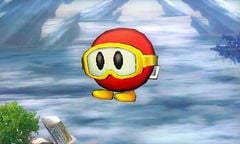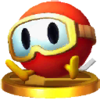Pooka: Difference between revisions
m (Text replacement - "{{[Ss]pecies-infobox" to "{{species infobox") |
Tag: Mobile edit |
||
| Line 28: | Line 28: | ||
|Jap=プーカ | |Jap=プーカ | ||
|JapR=Pūka | |JapR=Pūka | ||
|JapM=Possibly from「プー」(''pū'', onomatopoeia for puffing) and「プカプカ」(''pukapuka'', | |JapM=Possibly from「プー」(''pū'', onomatopoeia for puffing) and「プカプカ」(''pukapuka'', a term for "floating lightly") | ||
}} | }} | ||
Revision as of 02:38, May 18, 2022
| Pooka | |
|---|---|
 A Pooka in Super Smash Bros. for Nintendo 3DS | |
| First appearance | Dig Dug (1982) Mario Kart Arcade GP (2005, Mario series) |
| Latest appearance | Super Smash Bros. for Nintendo 3DS (2014, Mario series) |
Pookas are common enemies from the Dig Dug series. They are balloon-like enemies with goggles and wind-up feet. In their game of origin, they can easily be defeated with a few pumps of the main character's (known as Taizo Hori) air hose. Despite this origin, Pookas also make frequent appearances in Pac-Man games.
Pookas appear as a special item in Mario Kart Arcade GP and Mario Kart Arcade GP 2. The Pooka item is exclusive to, and can only be used by Pac-Man or Ms. Pac-Man. It can be shot forwards or backwards, and damage other players. Large neon signs based off of the Pooka sprite from the original Dig Dug can be seen in Mario Kart Arcade GP DX in the NAMCO Circuit course.
Additionally, Pookas appear as enemies in the Smash Run mode in Super Smash Bros. for Nintendo 3DS. They hop around aimlessly, only pushing the player back if they connect. They swell up when attacked, and take a few hits to fully defeat. They then leave a popping effect that does slight damage to other Smash Run enemies and causes an exploding chain reaction when near other Pookas. Hoards of them spawn as one of the events in Smash Run. Pac-Man also has the chance of a Pooka appearing in his Namco Roulette Taunt.
Super Smash Bros. for Nintendo 3DS trophy information
Names in other languages
| Language | Name | Meaning | Notes |
|---|---|---|---|
| Japanese | プーカ[?] Pūka |
Possibly from「プー」(pū, onomatopoeia for puffing) and「プカプカ」(pukapuka, a term for "floating lightly") |
